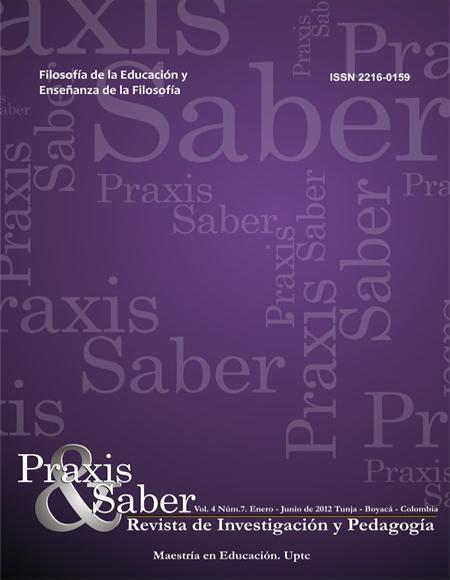teaching and learning philosophy in the daily interaction singularity

Abstract
This writing describes the possibilities and the limitations that are brought into play when teaching philosophy from what we understand of this activity, and from the ways to assume the social interaction’s patterns, configured by speech, knowledge, power and desire relationships. The purpose is to make visible the practices that take place when teachers, students and philosophers (throughout their production) meet in academic sceneries of professional training, where philosophizing takes different ways and senses in so far as it doesn’t accept hegemonic conceptions and speeches, nor the absence of thinking. Learning philosophy happens within this frame.Keywords
learning Philosophy, teaching Philosophy, social interaction’s patterns, daily interactions, Philosophy and experience.
Author Biography
Isabel Bernal Escobar
Magíster en Educación y Desarrollo Humano
Profesora Programa de Filosofía de la Universidad del Quindío
References
- Deleuze, G. & Guattari, F. (1993). ¿Qué es la filosofía? Barcelona: Anagrama.
- Larrosa, C. (2009). ‘Experiencia y Alteridad en Educación’. Larrosa, C.
- & Skliar, C. Experiencia y Alteridad en Educación. Rosario: Homo
- Sapiens Editores.
- Kohan, W. O. (2009). Infancia y Filosofía. México: Progreso.
- Pearce, W. Barnett. ‘Nuevos modelos y metáforas comunicacionales: el
- pasaje de la teoría a la praxis, del objetivismo al construccionismo social y de la representación a la reflexividad’. Freid, D. [Ed]. (1998). Nuevos Paradigmas, Cultura y Subjetividad. Buenos Aires: Paidos.
- Rancière, J. (2003). El maestro ignorante. Barcelona: Laertes.
- Sotolongo, P. (2006). Teoría Social y Vida Cotidiana: La sociedad como sistema dinámico complejo. La Habana: Acuario.
- Zuluaga, O. L. et ál. (2005). Foucault, la Pedagogía y la Educación. Pensar de otro modo. Bogotá: Magisterio.
Downloads
Download data is not yet available.